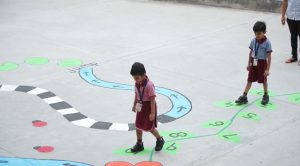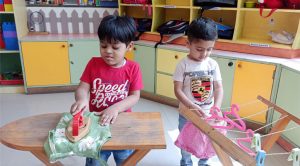“Almost all creativity involves purposeful play”
Children are like flowers: they are gorgeous, fragile, and one-of-a-kind. We nourish them so they can bloom and show off their vibrant colours. Playtime is the most beneficial time of the day for children when they can be nourished in many ways so that they can grow.

‘Games, sports, playtime’ are the most important ways for children to explore, learn, grow, and develop. This is the time of day when children demonstrate their incredible capacity for exploration and decision making. ‘Playing’ is sometimes referred to as ‘children’s work,’ is highly joyful for them. We may have understood as educators or parents that we do not have to force children to play or give rewards for playing. This is because youngsters appear to have a natural need to play, and ‘playtime’ provides a degree of enjoyment and interest that can be sustained without the use of external rewards.
Over 85% of a child’s cumulative brain development occurs before the age of six, indicating the critical importance of early brain care and stimulation in order to ensure healthy brain development and growth. Children must be interested and immersed in tiny funny outdoor and indoor plays from an early age.
Playtime encourages youngsters to employ their imagination, dexterity, physical, cognitive, language-communication, and emotional strength. Playing is essential for healthy brain development. Children as young as Bloomz and Toddlers explore and interact with the world around them via games. Playing helps youngsters to construct and explore a world that they can dominate, overcome their anxieties while gaining adult-like skills and build new competencies. As children master their surroundings, leading to increased confidence and resilience they will need to confront future hurdles. Small smart outdoor and indoor games teach youngsters how to cooperate in groups, share, care for others, negotiate, settle disagreements, and gain self-advocacy skills. When children are allowed to drive or lead playtime, they develop decision-making skills, proceed at their own speed, explore their own areas of interest, and eventually engage in the process of emotional bonding with peers.
Climbing, sprinting, ball games, digging, leaping, mazes, and dancing are all examples of active indoor and outdoor games that use both large and small muscles. These promote and support children’s general health and feeling of well-being, physical development, and appreciation for the advantages of active lifestyles and self-help skills such as dressing and eating. Dressing up, playing with toys like building toys, musical toys, crafts toys, and so on, as well as role play, can help children develop strong social and emotional skills and values. This allows youngsters to practice working with other children, build love and affection for one another, discuss ideas, and make choices and conclusions. It builds self-confidence via accomplishment and obstacles. As they act out feelings and events that may be worrying them, children learn to control their emotions, reduce impulsive behaviour, and reduce stress. This way, they learn to play alongside with other children, develop empathy and affection.

As parents and educators, we should employ a variety of play-based experiences to nurture children’s learning and development rather than planned ‘lessons’ or formal teaching experiences in the early years. We should build up age-appropriate tiny funny games indoors and outdoors that any youngster may play securely and enjoyably. “To promote and support children’s learning via play, we should provide materials that represent their ages, interests, knowledge, talents, abilities, and culture. Open-ended resources, such as blocks or cardboard boxes, develop creativity and the ability to modify concepts intellectually in youngsters,” says Sonal Mathur, parenting blogger and a mother of six years old, Dviti. “Observing children while they play in order to discover how they interact with other children, what abilities and comprehension they display while playing, and what activities might help them improve their play skills is very important,” she adds further. Participating in children’s games to expand learning and model abilities such as thinking, acceptable language, are positive actions. Allowing youngsters to explore their ideas and games by providing huge blocks of leisurely and uninterrupted play time is recommended.
The success of children as learners, dependent on strong foundations is laid from infancy. Play-based learning promotes and develops important skills, knowledge, appreciation, love, care, and attitudes that are necessary for a child’s lifetime learning and well-being. We must promote children’s learning by providing them with safe and enjoyable play environments. Hence let us propagate more play way methods for the wondrous holistic growth of our children and let them swim in the world of curiosity leading to innovation. Gottfried Benn has rightly said, “Whoever wants to understand much must play much.”
Author: Gunjan Sharma, Headmistress Early Years and Grade I, MRIS CW





